Montessori Parenting: Raising Your Child the Montessori Way
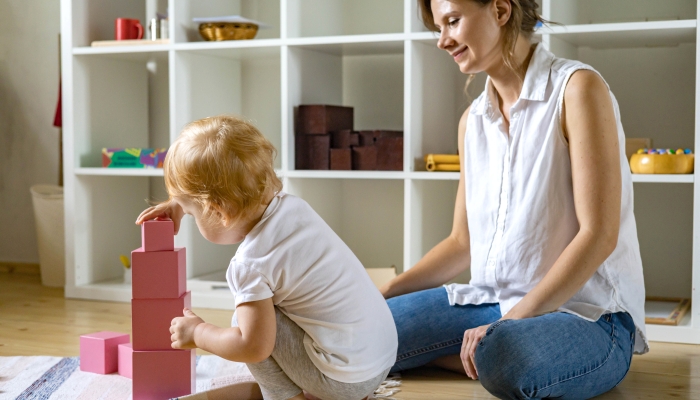
- Montessori parenting is a gentle parenting style that brings Montessori principles for early childhood education into your home environment and family life.
- Montessori parenting strives to make home life calm, peaceful, and full of opportunities for your child’s self-directed development and self-discipline.
- People may think that Montessori parenting is permissive, but it’s based on teaching your child respect, discipline, and independence in developmentally appropriate ways.
Permissive, authoritative, attachment, helicopter, free-range. If you’ve been reading about parenting styles, you’ve come across all these names at some point. You can now add another parenting style gaining momentum to that list: Montessori parenting.
If you’re thinking, “Oh no, not another parenting technique I have to learn about!” don’t panic. As with any parenting style, there are elements to Montessori parenting that might make sense to you and others that may not suit your family life at all.
The point is that the principles of Montessori education that so many parents swear by can be brought into your home through Montessori parenting. Before you write this off as just another parenting trend, you might find that raising your child the Montessori way may help you with some of the parenting hurdles you’ve been facing.
Introduction to Montessori Parenting
Montessori parenting is a gentle parenting style that brings the methods and principles of the Montessori classroom into your home. Maria Montessori was an Italian physician and educator in the early 1900s. She developed a theory of early childhood education that was revolutionary in its time and still popular today in many preschools and daycares.
Montessori believed that young children should be the directors of their learning. The job of parents, teachers, and caregivers is to create safe, interactive and interesting spaces in which children can exercise gross motor skills, practice real-world practical skills, and learn at their own pace.
Montessori parenting brings those ideas from the Montessori classroom into family life, allowing children to take the lead in their learning in a safe, prepared environment. Their parents act as their guides rather than their rescuers, disciplinarians, or dictators.
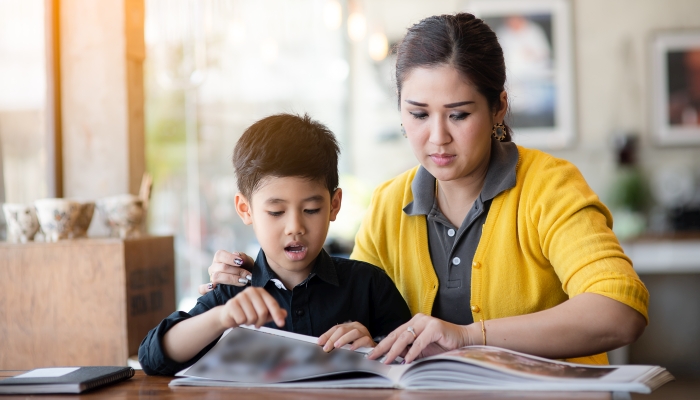
What are the principles of Montessori parenting?
Five principles form the foundation of Montessori education, which can be applied to parenting, including the following:
| Principle | What does it mean? |
| Respect for the child |
|
| Observe the child and pick up on sensitive periods |
|
| Foster independence through self-education |
|
| Prepared environment |
|
| Remember the absorbent mind |
|
Ultimate Guide to Montessori Parenting Style
Although it is described as a relaxed parenting approach, parenting using Montessori methods requires the parent to spend time observing their children, creating safe learning spaces, and being prepared to respond to their children’s preferences and interests.
Parents also need to think carefully about the set-up of the home environment and the accessible toys, games, and books it contains.
Here are some pointers for bringing the Montessori philosophy into your parenting:
Respect and discipline
Montessori parenting is not permissive. Instead, it’s based on showing respect. However, rather than reprimanding or punishing children for their mistakes, parents guide them to learn from the natural consequences of their actions.
Example:
A two-year-old child throws a plate of food on the floor. Rather than getting angry, scolding them, and putting them in time out, Montessori parents talk to the child and describe the situation. Then, together with the child, they clean up the mess.
Montessori parents know that this behavior is part of their child’s development and not a result of being “bad” or “naughty.” The child will learn from the consequences.
Child-led learning
Montessori parenting is all about letting the child lead their learning in their own time. Children learn from everything they do because, as Maria Montessori saw, children’s play is their work.
Example:
You have some spare time and want to spend it reading with your child. So you call them to come over to your stack of books from the library. Instead, however, you observe your child is absorbed in building a tower with their wooden block set, knocking it down, and building it up again repeatedly.
Rather than disrupting their focus and concentration, you wait until your child is ready to move on and then suggest reading to them as an option. You recognize that they are learning independently and take your child’s lead.
Learning by doing
A Montessori parent knows that children learn not just from toys and child-specific activities but from real-world tools and objects in their environment. The parent is the child’s role model; by imitating what they see, the child learns practical skills to use in everyday life.
Example:
Your child sees you mopping the kitchen floor. They want to get involved. Instead of saying, “You can’t help me with this; you’ll make a mess,” you allow your child to try the mop.
You accept that things might get a little messier before they get cleaner, but your child is practicing a skill and learning about helping and contributing to the household.
Freedom within boundaries
Allowing a child to play freely and choose freely are important Montessori tenets. However, this doesn’t mean your child simply does whatever they want. Instead, by creating a prepared environment, you provide your child with opportunities for activities and respect their choices.
Example:
You have ensured that your backyard is a safe, enclosed space. You have a swing set and climbing toys that your child can competently use. A Montessori parent may leave the backyard door open so their child can come in and out freely. They don’t hover over them or dictate how much time they spend outside but check that their child is playing safely.
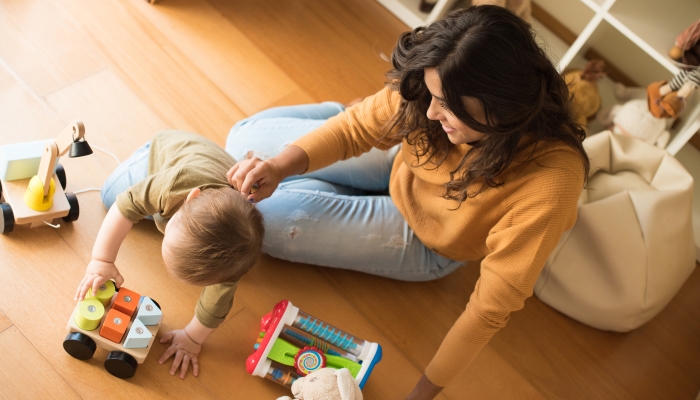
Benefits of Montessori Parenting
Proponents of Montessori parenting believe that there are many benefits, including:
| Benefit | Reason |
| Developing a strong bond between parent and child |
|
| Fostering independence in children |
|
| Teaching children practical life skills |
|
| Minimizing behavioral problems |
|
Drawbacks of Montessori Parenting
However, critics of Montessori methods point out that there are some limitations to this approach:
| Drawback | Reason |
| Minimizes creativity |
|
| Discourages social interaction |
|
| Children need to cope and adapt to other environments |
|
Is Montessori Parenting Effective?
Montessori parents and educators swear by the effectiveness of Montessori methods. They believe that they teach independence, respect and self-reliance. One study of Montessori-educated preschoolers has shown that they had higher academic achievement and social understanding outcomes.
Although Montessori methods seem free-flowing for children, some parents find them too structured. Creating a Montessori environment in your home requires a lot of thought and effort. Not all the toys, books, and decor you and your child prefer may fall within the Montessori ideal. Montessori parenting may not always fit within the time limits and demands of everyday life with multiple children.
However, many helpful elements of Montessori parenting strategies may lead to better understanding between you and your child, less frustration and fewer tantrums, and a calmer home environment.
Remember that every family is different, and every child is different. Montessori parenting might work wonders for you. Or, you might just pull one or two ideas from it that make sense to you, and that’s okay too.
FAQs
How do you create a Montessori environment at home?
A Montessori home environment is organized, so children know where to find things. Install low shelving or designate the lower storage spaces in your home for toys and games that your child can access independently. Don’t let children’s belongings take over your whole home.
Don’t put out all toys at once; instead, curate options for your children to access at different times. Stick to neutral and natural color schemes rather than bright colors or decorating with cartoon characters. Keep baskets or shelves of realistic books accessible to your child.
Finally, choose simple toys made of natural materials that teach your child a skill or exercise their gross motor movement, like Pikler triangles, wooden blocks, wooden puzzles, and object permanence boxes.
What’s the best age to start Montessori at home?
Proponents of Montessori methods believe you can start using the techniques with babies. Creating a sense of order, providing simple, natural toys, and curating an environment where a baby can safely explore one thing at a time can all be done from a very young age. You don’t have to wait for preschool!
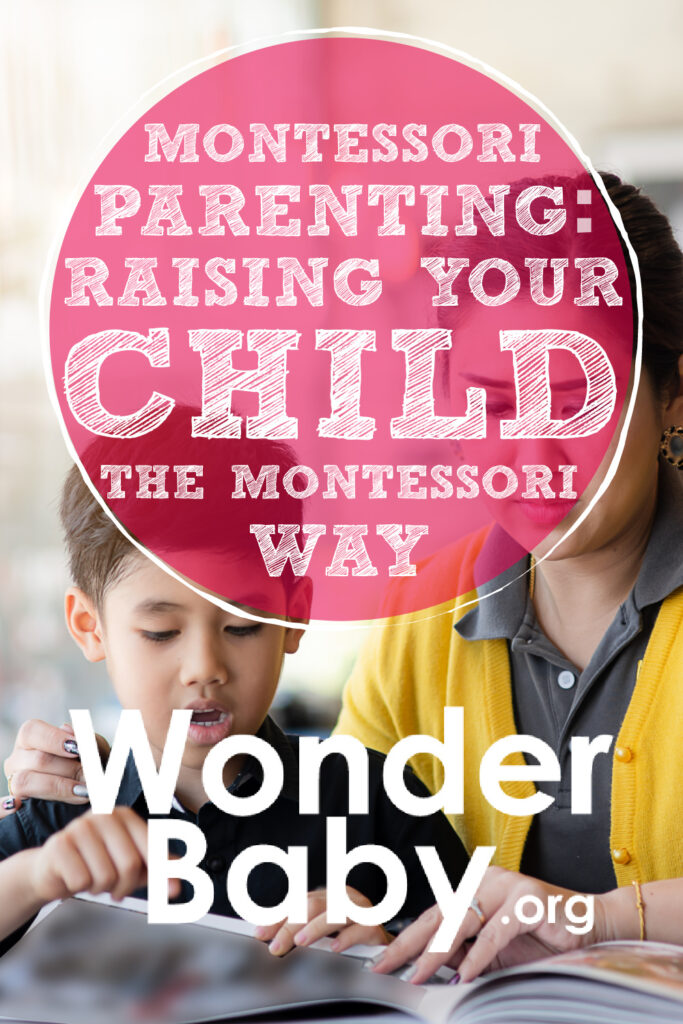
Related Posts
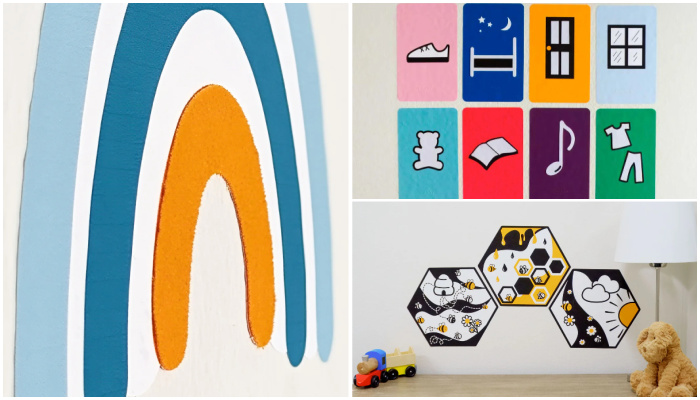
Parenting
Sensory Wall Art: 5 Tips to Create a Room Your Blind or Low-Vision Child Will Love
Even if your child can’t see their surroundings, personalizing and decorating their room with thoughtful, sensory-friendly design can make a big difference in their confidence, independence, and joy.
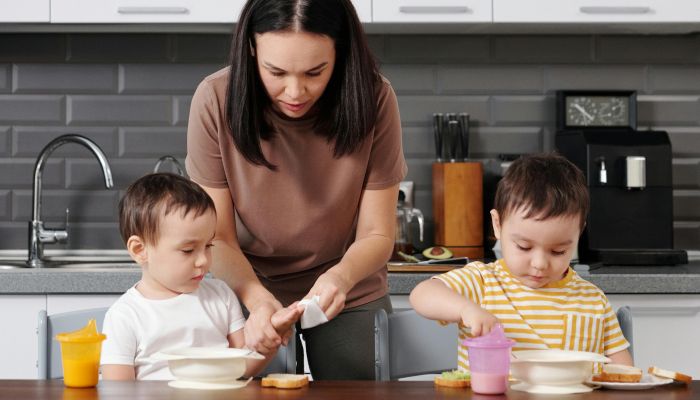
Parenting
4 Tips to Manage Twins Alone as a Single Parent
Taking care of twins alone as a single parent can feel overwhelming. Learn practical ways to help lighten the load.

Parenting
How to Manage Twin Escalation Syndrome
Discover effective strategies for managing twin escalation syndrome, including promoting individuality and fostering positive interactions.